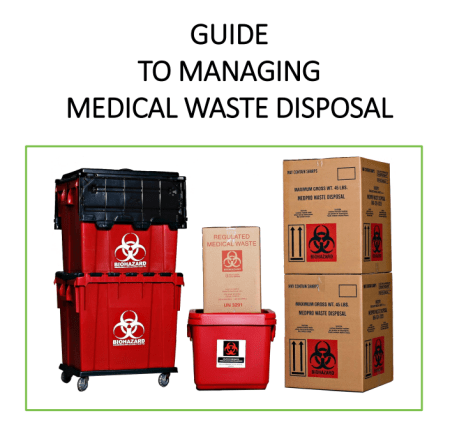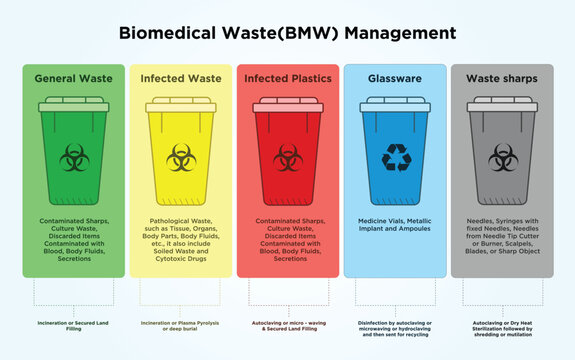Liable Solutions: Comprehending Medical Waste Disposal Services
In the realm of healthcare, the correct disposal of clinical waste is a critical facet that requires careful consideration. The relevance of managing medical waste properly goes beyond simple compliance with laws; it directly influences public health and ecological safety and security. As health care centers generate different kinds of waste that need specialized handling, recognizing the nuances of medical garbage disposal services is paramount. By exploring the complexities of this crucial process, we can shed light on the most effective techniques, advantages of expert solutions, and lasting services available.
Relevance of Appropriate Clinical Garbage Disposal
Appropriate medical waste disposal is important in maintaining a secure and hygienic environment within healthcare facilities. In health care settings, different types of waste are generated daily, consisting of infectious products, sharps, expired drugs, and chemical compounds.

Sorts Of Clinical Waste
Within healthcare centers, a varied array of waste products identified as clinical waste is generated, each calling for certain handling and disposal techniques. Pathological waste, which includes cells, organs, and body components, necessitates proper disposal to appreciate the dignity of the dead and stop any kind of biohazards. Recognizing the different kinds of medical waste is important for health care facilities to apply efficient waste administration approaches and shield public health and wellness and the environment.
Regulations and Conformity
Healthcare centers must stick to stringent guidelines concerning the handling and disposal of clinical waste to make sure compliance with lawful requirements and protect public health. These laws are implemented to avoid the spread of infections, safeguard the setting, and maintain the security of healthcare employees and the basic public. Various regulative bodies, such as the Environmental Defense Agency (EPA), the Occupational Security and Wellness Management (OSHA), and the Department of Transport (DOT), have details guidelines that health care facilities should comply with.
To adhere to these laws, healthcare facilities should properly segregate, store, transportation, and dispose of various types of medical waste. This includes sharps waste, infectious waste, contaminated materials, and pharmaceutical waste, each requiring particular dealing with procedures. Facilities must likewise preserve precise records of waste generation and disposal to demonstrate compliance during assessments.
Non-compliance with medical waste regulations can lead to severe penalties, fines, and damages to the center's credibility. It is necessary for medical care centers to stay informed regarding the most recent guidelines and execute robust conformity actions to secure public health and wellness and the environment.
Benefits of Professional Disposal Services
Engaging specialist clinical waste disposal solutions he has a good point supplies healthcare facilities a trustworthy and efficient option for handling hazardous materials. By outsourcing this essential job to specialists, health care facilities can guarantee compliance with laws while concentrating on giving top quality care to individuals. Among the key advantages of expert disposal solutions is the expertise they bring to the table. These services employ trained experts who are well-versed in dealing with different kinds of medical waste, making certain correct partition, product packaging, transport, and disposal.
Furthermore, expert disposal solutions make use of cutting edge devices and adhere to market ideal methods to minimize environmental influence and decrease the danger of contamination. This not only promotes a safer job setting for medical care personnel yet also adds to overall public wellness and security. Additionally, outsourcing medical waste disposal can result in cost financial savings over time by getting rid of the demand for internal administration and disposal systems.
Lasting Practices in Health Care

One key sustainable method in medical care is waste reduction. By executing strategies to minimize unneeded packaging, single-use things, and general waste generation, medical care facilities can substantially lower the quantity of waste sent out to landfills or incineration. In addition, recycling programs for products like paper, glass, and plastic can better minimize the environmental influence of medical care operations.

Final Thought
To conclude, proper clinical garbage disposal is important in maintaining a healthy and balanced and risk-free environment for both healthcare workers and the basic public. Recognizing the various types of medical waste, following regulations and conformity requirements, and utilizing professional disposal solutions are essential action in liable waste administration. By adopting lasting methods in medical care centers, we can reduce ecological impact and make sure the wellness of all individuals associated with the healthcare sector.
As healthcare centers generate different kinds of waste that require specialized handling, recognizing the nuances of medical waste disposal services is critical.Within healthcare centers, a diverse selection of waste products identified as medical waste is produced, each needing specific handling and disposal methods. Comprehending the numerous types of clinical waste is vital for healthcare facilities to execute reliable waste management methods and protect public health and the setting.
By executing techniques to minimize unneeded product packaging, single-use products, and overall waste generation, medical care centers can substantially lower the amount of waste sent to landfills or incineration. Recognizing the various types of medical waste, complying with regulations and conformity standards, and using expert disposal solutions are crucial actions in accountable waste administration.